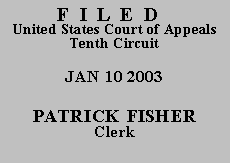

| JAMES A. WILLIS,
v.
N. L. CONNOR |
No. 02-3216
D.C. No. 02-CV-3017-RDR |
But motions under § 2241, such as the one Willis now files, are generally reserved to challenge the execution of a sentence rather than its validity. Bradshaw v. Story, 86 F.3d 164, 166 (10th Cir. 1996). The proper venue for attacking a sentence itself is under § 2255. 28 U.S.C. § 2255.
Moreover, claims may only be made under § 2241 when the statute is the litigant's exclusive remedy. Bradshaw, 86 F.3d at 166. Willis's claim here is more properly brought under § 2255 as it challenges the validity of his sentence rather than the conditions of his confinement. Id. (holding that a petition under § 2241 cannot be "an additional, alternative, or supplemental remedy to 28 U.S.C. § 2255"). He makes no other showing that § 2255 would be inadequate or ineffective as a remedy. Id.
Mr. Willis's motion to replace pages in his brief is denied as moot. For substantially the reasons stated by the magistrate judge and the district court, we AFFIRM the denial of Willis's § 2241 motion.
ENTERED FOR THE COURT
David M. Ebel
Circuit Judge
*.After examining appellant's brief and the appellate record, this panel has determined unanimously that oral argument would not materially assist the determination of this appeal. See Fed. R. App. P. 34(a)(2) and 10th Cir. R. 34.1(G). The case is therefore ordered submitted without oral argument. This order and judgment is not binding precedent, except under the doctrines of law of the case, res judicata, and collateral estoppel. The court generally disfavors the citation of orders and judgments; nevertheless, an order and judgment may be cited under the terms and conditions of 10th Cir. R. 36.3.